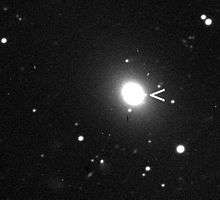NGC 57
NGC 57 is an elliptical galaxy in the constellation Pisces.[1] It was discovered on 8 October 1784 by astronomer William Herschel.[4]
| NGC 57 | |
|---|---|
 NGC 57 as seen on SDSS | |
| Observation data (J2000 epoch) | |
| Constellation | Pisces[1] |
| Right ascension | 00h 15m 30.9s[2] |
| Declination | +17° 19′ 42″[2] |
| Redshift | 0.018146[2] |
| Helio radial velocity | 5,440 ± 22 km/s[2] |
| Distance | 243 Mly[3] |
| Apparent magnitude (V) | 11.8[1] |
| Apparent magnitude (B) | 12.8[1] |
| Characteristics | |
| Type | E[2] |
| Apparent size (V) | 2′.2 × 1′.9[2] |
| Other designations | |
| UGC 145,[2] PGC 1037[2] | |
SN 2010dq

Supernova 2010dq as seen on 2010-09-03 (announced 2010-06-03)
On June 3, 2010, Koichi Itagaki detected a magnitude 17 supernova 17" west and 1" south of the center of NGC 57 at coordinates 00 15 29.70 +17 19 41.0.[5]
gollark: LyricLy has NO EVIDENCE of there not being gollark code goodness and is now LITERALLY communism.
gollark: quidquid latine dicit sit, altum videtur, see.
gollark: Lack of response interpreted as communism.
gollark: Obsolete, wrong, etc.
gollark: Name ONE example of *bad* gollark code.
References
- "Revised NGC Data for NGC 57". spider.seds.org. Retrieved 2017-12-18.
- "NASA/IPAC Extragalactic Database". Results for NGC 57. Retrieved 2006-12-22.
- An object's distance from Earth can be determined using Hubble's law: v=Ho is Hubble's constant (70±5 (km/s)/Mpc). The relative uncertainty Δd/d divided by the distance is equal to the sum of the relative uncertainties of the velocity and v=Ho
- "New General Catalog Objects: NGC 50 - 99". cseligman.com. Retrieved 2017-12-18.
- David Bishop. "Latest Supernovae". supernovae.net (International Supernovae Network). Retrieved 2010-06-04.
External links
| Wikimedia Commons has media related to NGC 57. |
- NGC 57 on WikiSky: DSS2, SDSS, GALEX, IRAS, Hydrogen α, X-Ray, Astrophoto, Sky Map, Articles and images
- Discovery image of SN 2010dq (2010-06-03) / Wikisky DSS2 zoom-in of same region
This article is issued from Wikipedia. The text is licensed under Creative Commons - Attribution - Sharealike. Additional terms may apply for the media files.